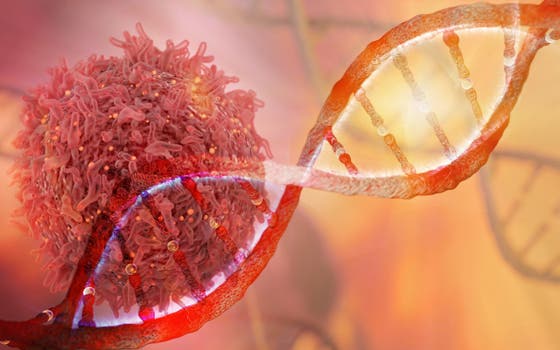Metastases unravelled by unique DNA analysis

Why do some tumours spread, and others don’t? Researchers of UMC Utrecht, Hartwig Medical Foundation and Vall d’Hebron are trying to find the answer to this question. Their research has now resulted in relevant clues to improve cancer treatment and prevention. Today, the results of their two studies were published in renowned science publications Nature and Nature Genetics.
When a person suffers from cancer, cells slowly transform from benign into malignant because of DNA adjustments. Initially, the ‘primary’ tumour stands alone but sometimes the DNA mistakes keep on accumulating, and cells will start to separate from the initial tumour. Result: the cancer will spread to other parts of the body, significantly decreasing the chances of survival for the patient.
Understanding biological processes
In order to comprehend which biological processes will cause cancer to spread, the researchers of UMC Utrecht’s Center for Molecular Medicine, Hartwig Medical Foundation and Vall d’Hebron have thus joined forces. Using a unique Dutch data collection, they have succeeded in analysing and interpreting the DNA specifics of more than 7,000 cancer patients.
Analysing DNA
By doing so, they have systematically categorised the differences between primary and metastatic tumours for 23 of the most prevalent tumour types. Plus: they have signalled how those tumours tend to evade the controlling role of our immune system. For this large-scale data analysis, the researchers have used so-called 'whole genome sequencing’. With this highly advanced technique, the complete DNA of tumours can be determined. Also, it helps researchers to interpret which changes occur when and after tumours come into being.
How peculiar: metastatic tumours?
The first scientific study, dealt with in Nature, revolves around the following question: in what way do metastatic tumours differ from primary ones? To tackle this question, the researchers investigated the overall DNA differences between primary and metastatic tumours. Conclusion: the extent to which a metastatic tumour has undergone major changes depends on the type of cancer.
With skin cancer, for instance, the differences between the primary and metastatic tumour are minor. But with other cancer types, such as lung and prostate cancer, the tumour could have changed significantly. Even to such an extent that tumours don’t seem to be related any more. How is that possible? The researchers have found out that the accumulation of the level of DNA faults strongly depends on a diversity of processes. For specific cancer types, these processes partly seem to overlap, but they can also differ in a major way. Furthermore, the researchers have concluded, paradoxically enough, that previous cancer treatments could have contributed to DNA changes. For instance, in some metastatic tumours, new cancer characteristics were discovered that had resulted from increased resistance to treatments the patient had already undergone.
Immune system: trick or treat?
The second study, published in Nature Genetics, focuses on the question: which genetic mechanisms are used by a cancer cell to escape from our immune system? Because of changes in its DNA, each tumour cell tends to turn into an ‘intruder’. Normally, such a ‘foreign’ cell is immediately discovered by our immune system and disposed of. But a tumour that has had the chance to evolve, has apparently acquired characteristics that are able to trick or evade our immune system. The researchers think this is possible because several genetic mechanisms in that tumour cell are being disrupted.
Which genetic trick is being used by the tumour depends on the specific type of cancer. The researchers have succeeded in categorising how often specific mechanisms are being used by which tumour types to deceive our immune system. This is extremely useful, as these results might help to, for instance, improve the efficacy of promising immunotherapy treatments.
More ways to personalise
The results of the two studies show what genetically happens when tumours spread to other parts of the body. And they help us to understand when and how our immune system is being deceived. Consequently, the researchers have significantly contributed to the ways in which cancer treatments can be personalised for every single patient, in accordance with the tumour type and the stage of metastasis (instead of giving everyone the same, standardized treatment).
Furthermore, the research outcomes help to develop treatment strategies aimed at preventing the tumour from spreading any further. The studies will even be more effective because the results will be published in open data sets, which can be consulted and used by cancer researchers and medical specialists from all over the world.
Research coordinator and professor of Human Genetics Edwin Cuppen (UMC Utrecht and Hartwig Medical Foundation): “Our conclusions can be used as the starting point to improve diagnosing tumour types, personalising therapeutic treatments and, in the future, preventing metastatic cancer. Our results also show how important it is to systematically collect and disclose data in health care. Our research would have been impossible without the consent of all those patients and the widescale cooperation with Dutch hospitals. Otherwise, all our new, extremely useful insights would have been lost for future oncological health care.”
This research was conducted in the context of Oncode Institute, a research partnership made possible by KWF Dutch Cancer Society and the Dutch Ministry of Health, Welfare and Sports, the Dutch Ministry of Education, Culture and Science, and the Dutch Ministry of Economic Affairs and Climate Policy.
